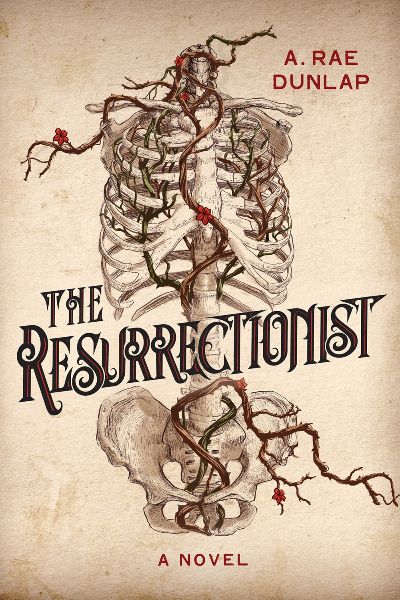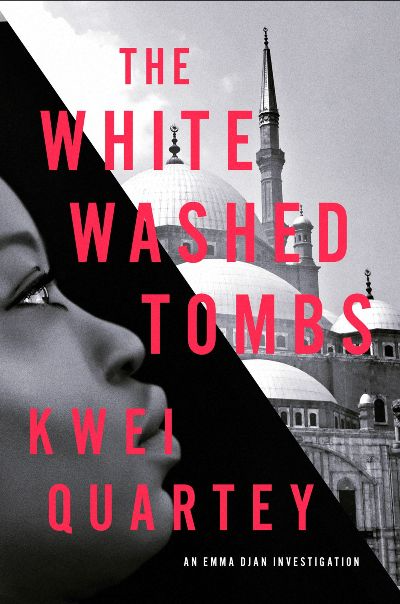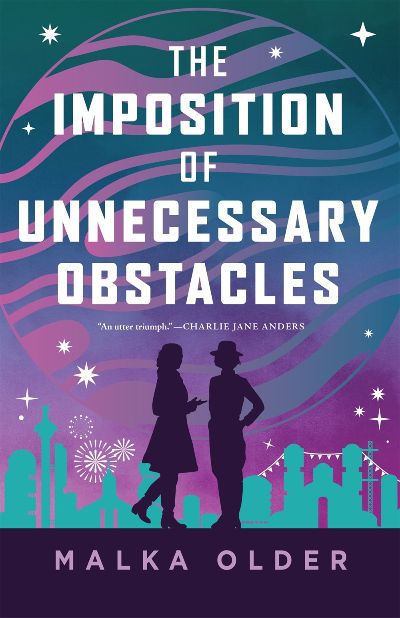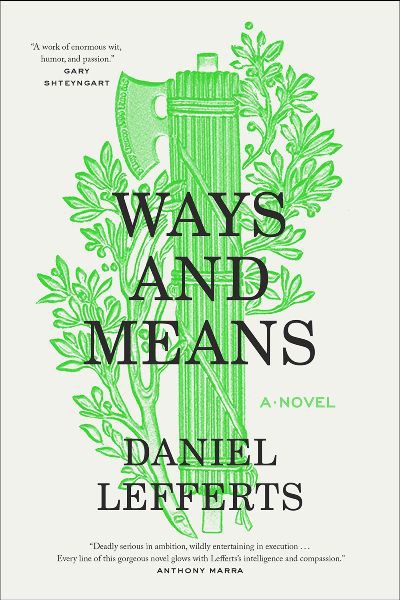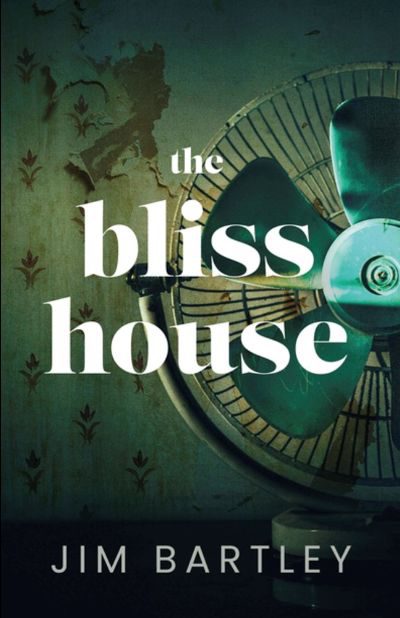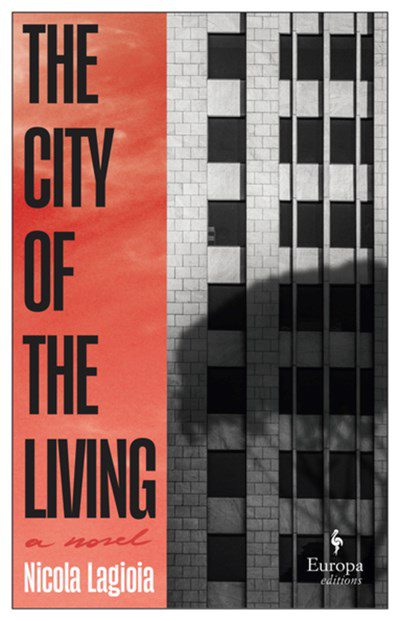The many fans of Jane Pek’s first book, The Verifiers, will be thrilled to get their hands on this new novel featuring the indomitable Claudia Lin. In this darker and tougher novel, with a robust comic streak and a deep foray into technology—featuring synths, the scary new generation of bots—Claudia can’t help but employ some espionage tropes as she investigates a corrupt matchmaking firm with the help of a corporate whistleblower. But there is plenty else to distract Claudia. Her family is falling apart at a prodigious rate; she is barely speaking to any of them. Romantic tensions are growing between Claudia and not one but two women, one of whom is the ever soignée Becks, Claudia’s one-time boss and major crush. Questions about sexual identity are sending these 20-somethings spinning in and out of the proverbial closet. While Inspector Yuan, a character created by Claudia, provides plenty of maxims throughout the text. Lots of fun, but also some real terror, in what is a brilliant depiction of New York City.
LGBTQ+
As the third son of a modestly landed family, James Willoughby has been told from an early age that he must earn a living befitting his station. Being of “a diminutive stature,” James decides the military is not for him. Nor is the Church of England an appealing option. Despite his family’s opposition, the young man abandons his clerical studies at Oxford and heads north to Edinburgh to become a physician. It’s 1828, the Age of Enlightenment, and the Scottish city is a “shining beacon of medical discovery.” But James quickly learns that if he wants to develop anatomical knowledge and surgical skills, he must join one of the private schools in Surgeon’s Square. Unable to afford the additional tuition, James makes a bargain with his professor’s secretary and dissectionist, the charismatic Aneurin “Nye” MacKinnon, to serve as a lookout to prevent possible grave robbing in the Greyfriars kirkyard (graveyard) beneath James’s chamber window. The naive student soon discovers that he is aiding a gang of body snatchers who steal fresh corpses from churchyards for anatomical study at the medical schools. Nye explains to a horrified James that he is a Resurrectionist: “Our motivation is not in the value of the bodies we steal, but in the second life we give them.” Bedazzled by Nye’s scientific passion (and his dark sexiness), James plunges into this illicit, gritty underworld. However, their rivals in the body-snatching game, the sinister Burke and Hare, will murder anyone to corner the corpse market. Mixing a macabre gothic mystery with a sensitive coming-of-age tale and a touching queer romance, Dunlap has written an exciting, well-researched debut historical adventure. Bizarre, authentic details, like the mortsafes, or cages, that grieving families installed to protect the graves of their loved ones, make for an unforgettable read.
This piercingly written tale of modern life in Ghana is preceded by a warning in Quartey’s heartfelt prologue that his novel includes scenes of violence against gay characters and should be approached with “caution and mindfulness.” That’s fair to say, but it must also be noted that the violence is in keeping with the story and not gratuitous, except on the part of the criminals. The effects of white-supremacist missionary work in Africa also loom large in the story, which centers around the murderous homophobia stoked in Ghana by an American evangelical Christian, Chris Cortland. His bigoted ways have brought him to Africa where he finds a home among those who believe that “homosexuality isn’t indigenous to Ghana.” The tale features many well-drawn characters, all presented in an opening character list (don’t be put off by the full to bursting cast here!). They fall into three main groups: trans women who are being murdered, with famous Ghanaian pop singer Henrietta Blay the focus; Emma Djan and the other private investigators who who make this police-procedural-esque, employed because “the police might not give the case high priority”; and the smarmy, self-righteous circle of Americans and Ghanaians around Cortland, whose behavior means the book could also come with a domestic violence warning. The murder mystery is compelling here, but readers will also be absorbed by the politics and religious machinations and the emotional brutality the mixing of the two creates.
Perhaps only in New Orleans can there be a gay novice nun who is also a novice private detective and who offers up prayers like, “Hail Mary, share with me your divine vision, because I can’t see a fucking thing.” The nun in question is Sister Holiday, who teaches in a private school, runs a support group for survivors of Catholic Church sexual abuse, and on the side partners with a former cop to run Redemption Detective Agency. When the two hit the banks of the Mississippi to meet a new client, Holiday finds herself wading into the water to catch a body before it floats away. It’s her parish priest, and that awful discovery isn’t the last. Returning to school, the nun finds that another priest is missing. He seemed a kind young man, not one of the priests that Holiday loathes for their fake piety and fondness for their parishioners’ money. While a storm rages, Holiday must face the contradictions that are her life and life in New Orleans as well as help her brother and others face their demons, all while trying desperately to solve the mystery of the missing priest. Douaihy’s first in the series, Scorched Grace, was a New York Times Book Review Editors’ Choice, among other accolades. Fans of that book, as well as all who love an irreverent and smart lead, will happily join Sister Holiday for her second outing.
Whenever you love a book—that would be me and the first book in this series, The Mimicking of Known Successes—you can only approach the next installation with some trepidation. So I’m happy to report that this book more than lives up to my expectations—although it’s important to read the books in order. It’s set against a rather simple mystery: 17 students and staff members are missing from Valdegeld, the Oxbridge-like university where Pleiti is a professor. This is a space opera and a detective story, a romance and a cozy mystery, with the investigation led by Mossa, Pleiti’s lover and a detective, who in this story explicitly asks Pleiti for her help. Set in part on Giant, the huge rings that surround Jupiter and where many humans have settled, this narrative includes a lengthy trip to far-off Io, one of Jupiter’s moons. The pleasures in this book are many. There’s the growing relationship between the two women, especially Pleiti’s worries that Mossa may not have feelings as strong as she does. There’s the brilliant world-building, with special attention to the far-off settlements the two women seek out, revealing the fascinating means of travel and the many smaller, human communities scattered across the vast planet. Finally, there are ruminations from Pleiti about the aim of returning to Earth, her research area, and the hints of political dissent. Brilliant on all counts.
It’s thrilling to discover a debut this brilliant, full of wonderment, humor, and above all, love. Alistair McCabe, gay and handsome, smart and funny, arrives at New York University from upstate to pursue his destiny as a financial whiz kid. He’s got the talent, the obsessiveness, the drive—and the desire to help his Mom, who has done so much for him. Sweet, right? But being a brainiac isn’t quite enough—you need to fit in with the finance bros—and a much coveted banking internship leads to, well, nothing. Except for more debt. Fortunately, there’s Mark and Elijah, a couple ten years or so older who take him in as their third paramour (we’re spared “throuple”). Mark, a sort of small-time trust funder, and Elijah have their own set of troubles, which they’re happy to cast aside whenever Alistair visits. Alistair is eventually offered an opportunity to work for an elusive, sinister billionaire and he jumps at it while continuing to investigate the mogul’s wealth. What he discovers catapults him out of the life he had come to know into one both terrifying and wildly anxiety producing. Lefferts moves around the narrative with ease, visiting family and friends, picking up a character or two then setting them down. Slowly these scenes fall together and this expansive novel becomes far greater than the sum of its parts. Comparisons to Hanya Yanagihara’s A Little Life are inevitable, and in both books there is plenty that horrifies. But also, like A Little Life, it’s ultimately friendship that saves the characters. And us as well.
In the rural Ontario Bliss House live 17-year-old Cam; his cousins Wes, who’s in his late twenties; and Dorie, who’s five and is a distant relative Gramp and Gran took in. Gran died a few months ago and her abusive, alcoholic spouse not long after, but Gramp is not quite gone, his corpse hidden under a tarp in the house’s cold room. With no will leaving the house and farm to the remaining family, what else can they do? Wild-child Dorie is able to keep Gramp’s death a secret, as well as her knowledge of the game Cam and Wes play in Wes’s bedroom, the same one, she thinks, the nasty neighbor boy, Kyle, wanted to play with her in the barn. The ramshackle family is just starting to believe things are safe when Kyle’s mother sets the Misses Gurney on them. Beulah and Audrey Gurney are with Bethel Baptist and Dorie’s attire—or lack of it—when she plays in the yard is, they say, “the Lord’s business.” They brush Kyle’s behavior aside (“They’re Pentecostal”) but cannot see their way to ignoring Wes and Cam’s “sin,” launching the Bliss boys on a startlingly violent and engrossing path to keep their family and love safe from the state. Young adults as well as adult readers who aren’t squeamish (terms like “corpseooze” stand out) will root hard for this loving family and stay up to find out how their bizarre, Murphy’s-law-ridden odyssey turns out. Playwright Bartley’s previous fiction is set in Balkan war zones, making this memorable work a fresh start.
A deep, dark descent into one of Italy’s most disturbing true crimes, drawing on actual documents, news reports, and interviews to tell the story. Billed by the publisher as a “spellbinding literary thriller”—it’s certainly spellbinding, but no one’s definition of a thriller—this is a slow, methodical, layered journey into the murder of 23-year-old Luca Varani. The method? Torture. The perpetrators? Manuel Foffo, who confesses to his father, while driving to a family funeral, that he killed someone—three, four, five days ago?—he’s too drugged out to know. And Marco Prato, also from a “good family,” a nightclub promoter, gay and considering transitioning. Manuel and Marco barely know each other, although after several drug-and-alcohol fueled days holed up in Manuel’s apartment they develop an intimacy that’s somewhat sexual but more a twisted sort of friendship. “So-called psychic contagion, like a racing engine, brought the two young men close to the point of fusion.” What do they share, besides a love of drugs and alcohol? For starters, an inability to mature, jealousy of the rich, and complete irresponsibility. Lagioia intertwines the descent of Manuel and Marco with the descent of Rome itself—drug filled, rat-infested, garbage strewn, home to wild animals, yet ultimately, he claims, freeing. This story begs for comparison with the Nathan Leopold and Richard Loeb murder of Bobby Franks in 1924 Chicago. Brilliantly translated.
Ben Rosencrantz leaves his job as an English professor and returns home to Sugar House, a suburb of Salt Lake City, newly divorced from his husband and ready to help his ailing dad run the family’s game shop. The store is struggling financially, so Ben’s initially torn when Clive, a customer known for unscrupulous methods, offers a chance to buy a rare board game worth thousands of dollars. But when Ben tells the seller no thanks, Clive is livid. The next time Ben sees Clive is when his dead body lands on the store’s doorstep. Ben and Ezra, the cute florist from next door, decide to investigate on their own but quickly learn that the case is no game. Connor’s large and charming cast of characters is so engaging that the mystery, while fun to solve, is just icing on a multi-layer cake. Many cozy mysteries have recipes in the back of the book, but this one has rules for a fun game and questions for your next book club meeting. Whether you are a fan of LGBTQ fiction or not, this is a terrific debut.
What the world needs now is a great, queer detective, and Rosen is well on his way to creating him. The second in the series—the first was fun but also a bit idiosyncratic—this has the makings of a classic detective novel with a strong supporting cast. It’s San Francisco in 1952, and we’re back with struggling detective Andy Mills, whose home and office are above Ruby, a gay bar. Ex-navy and an ex-cop, Mills is still struggling to gain acceptance from the queer community. But along comes a case that may help him turn around his image. First one, then several people, it turns out, are being blackmailed—sex photos taken in a hotel, holes drilled through the wall—and Mills is on the case. But as with any good crime novel, the story isn’t what you first expect, and soon Andy is reunited with his Navy flame who disappeared seven years ago. Set against the queer bars of the city, the continual raids orchestrated by the police, and the foggy bay itself, this book is powerfully atmospheric. It ends leaving Andy free from the past and ready for the future. Exactly what most readers will be waiting for.


